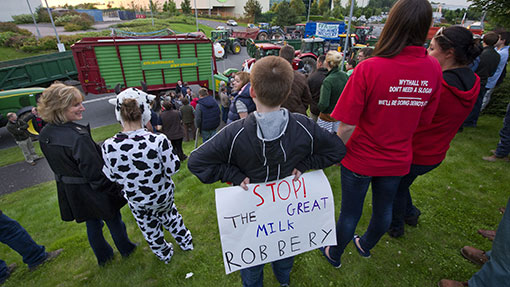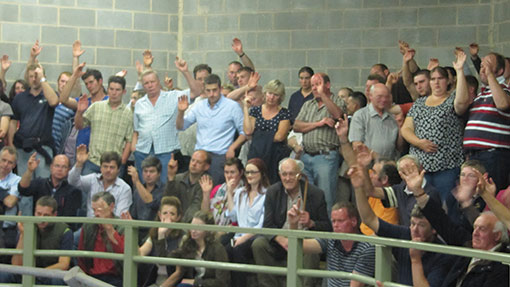Dairy farmers warn of fresh price protests

More than 400 dairy farmers from across the Midlands have voted to support a new wave of milk price protests unless processors move to reverse the latest milk price cuts.
At a meeting at Market Drayton Auction Market on Thursday (18 September), hundreds of producers said they would back 24-hour protests if discussions with processors over prices failed.
Hosted by Farmers For Action, the meeting was the latest in a series being held across the country to discuss how to respond to the ongoing dairy crisis, which has seen prices slashed by as much as 3p/litre over the past month.
See also: Milk protests may resume in October

While FFA chairman David Handley said now was not the right time to hold protests, he said direct action could become necessary “if all else failed”.
In an impassioned address to farmers, he said future protests would be different to those held in 2012 (pictured top) to ensure processors understood how serious the situation was for UK producers.
“If we resort to protests it will be different to last time,” he said. “We won’t be there for two hours, we will have to be prepared to make a sacrifice and be there for 24 hours.
“Last time we stopped too soon, but we were working with other organisations and we felt we could deliver without going further.
“Protesting in 2014 is a ridiculous scenario to find ourselves in, but it looks like the only thing [processors] understand.”
Mr Handley said FFA was demanding answers from processors and retailers over why UK dairy prices had been cut so dramatically.
While the effects of an increase in global supply, falling demand in China and the Russian trade embargo would be felt to some degree on the domestic market, they were being used as an excuse to lower prices for British farmers, he claimed.
He said processors and retailers were making too high a margin from milk and that more of the profit should be handed back to farmers.
But Mr Handley also said that farmers needed to think about their position in the supply chain and react accordingly.
Where necessary, they should reduce production to not only cut feed and input costs, but to limit domestic supplies, which would force milk buyers to pay more.
“We are 11% above global demand and processors are taking advantage of the situation,” he said.
“We have to remember we are in a supply chain and we have to be very conscious of supply and demand.
“Do your maths and talk to your processor before you carry on chasing volume.
“If they ask you to keep producing more then drop the price we can go after them, but if they tell you to hold on, you have to listen.”
